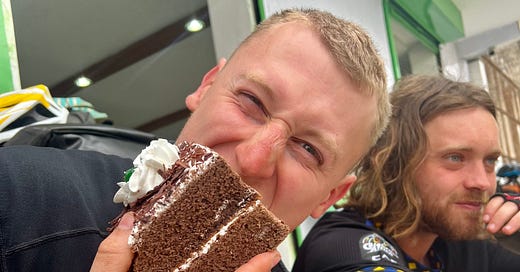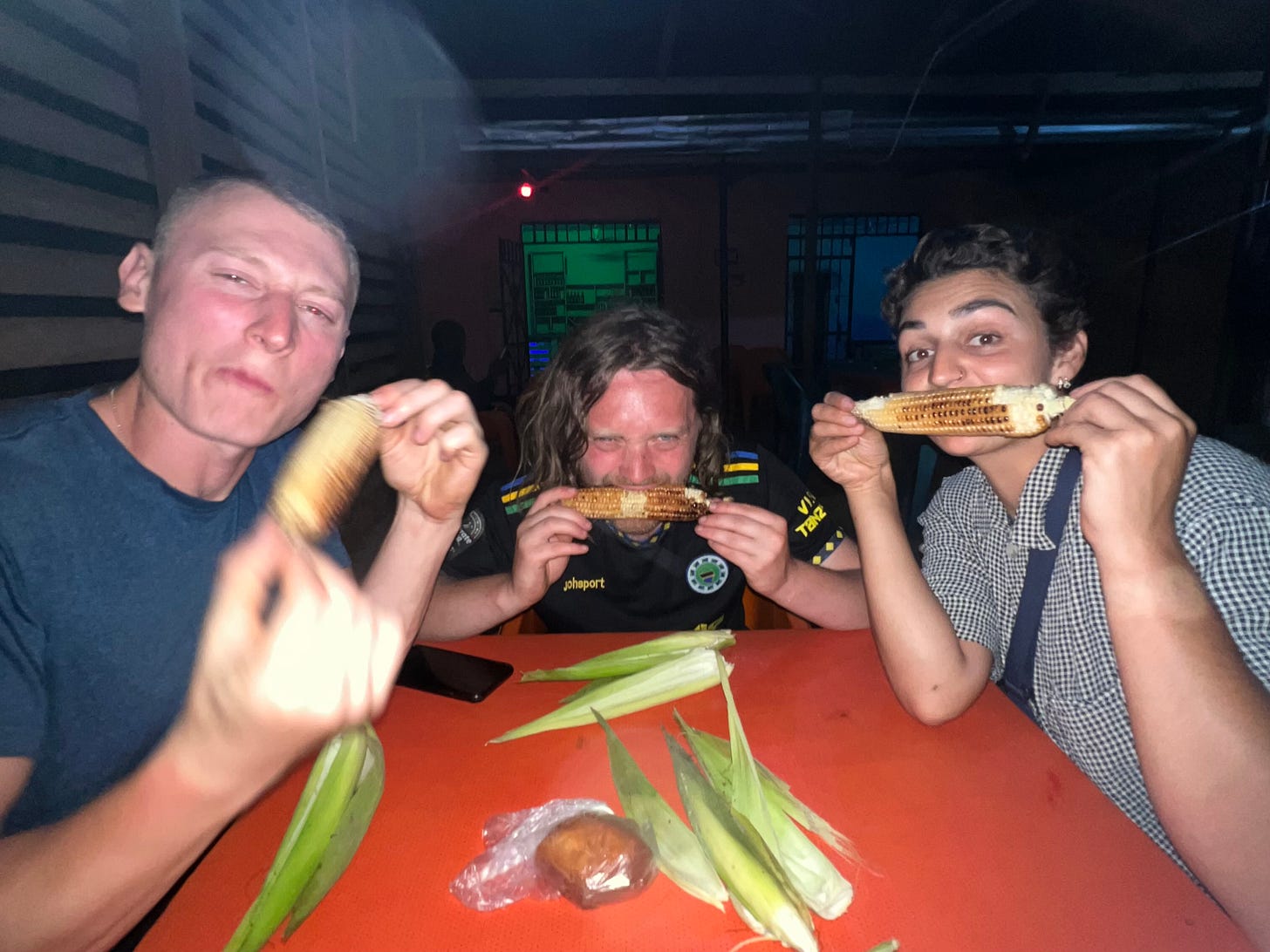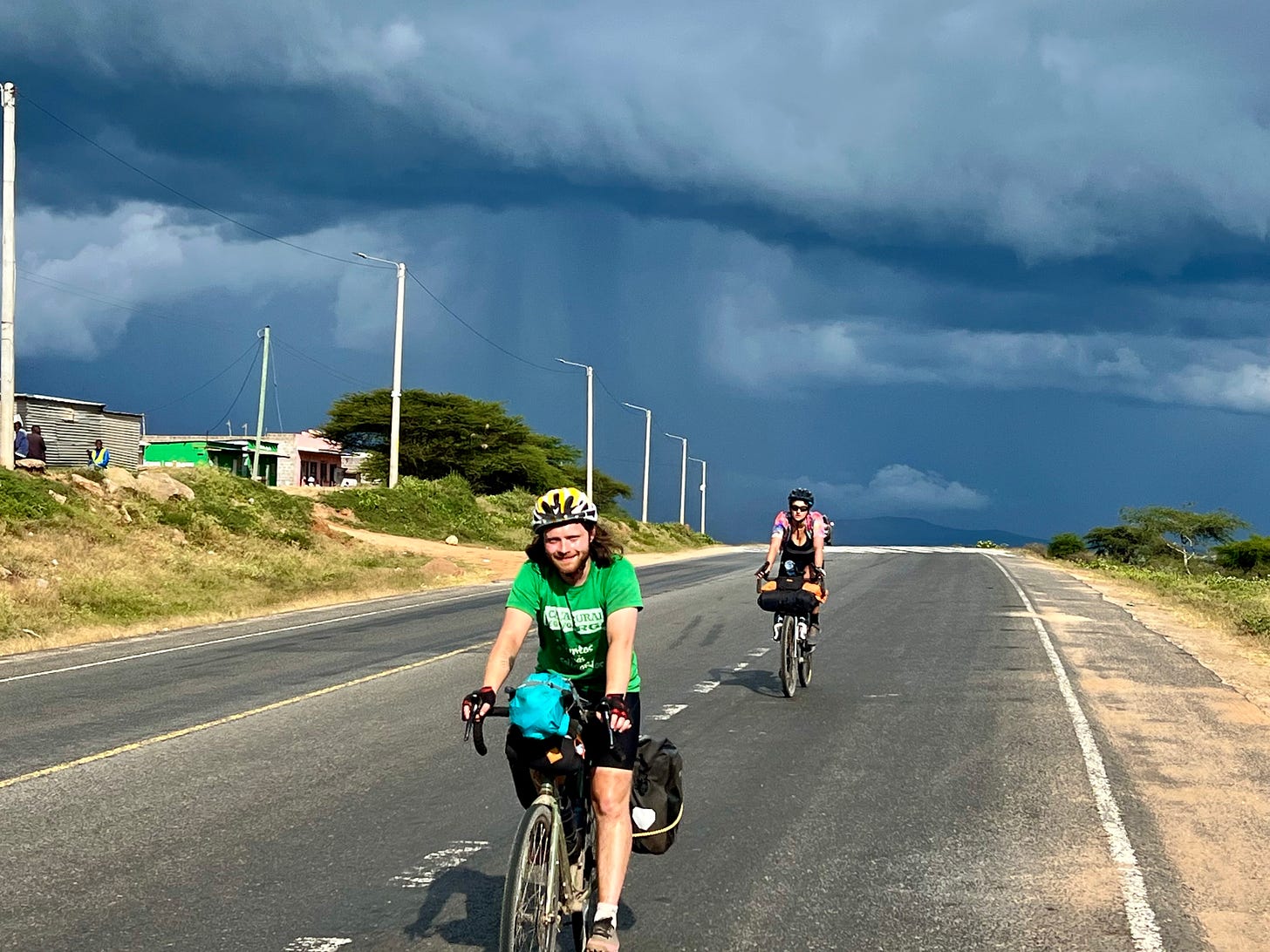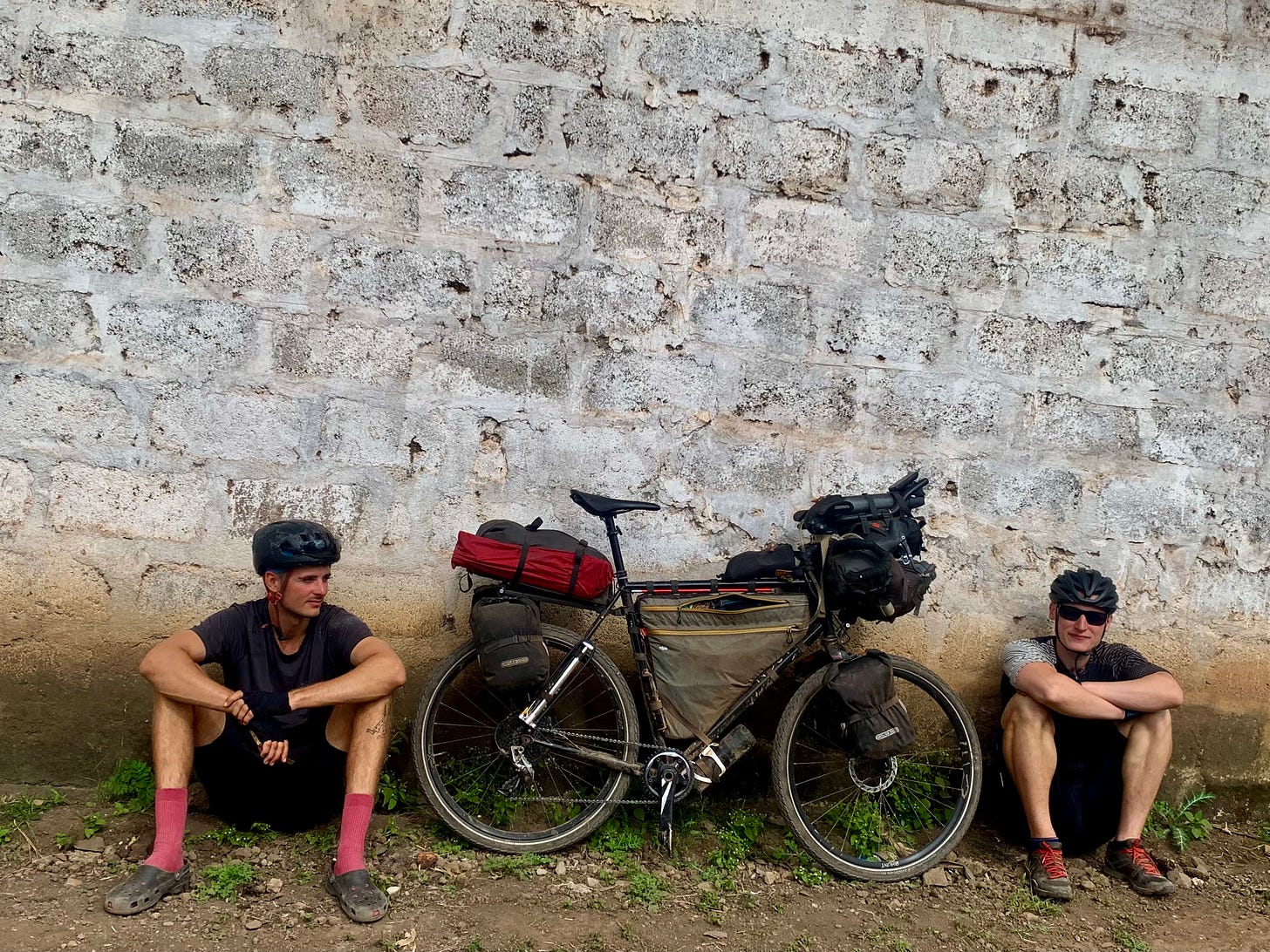We woke in Longido to a breakfast of factory-farmed bread and fluorescent jam; a touching attempt by our hotel to recreate the imagined comforts of the Western home. While we’d no doubt have preferred the traditional chapati and beans, preference takes a back seat the morning after a Big Ride. Between the failure of our official safari, and the success of our unofficial one, we’d managed to squeeze in a cool 155 kilometres of mountainous riding. Covering this sort of distance on loaded bikes is no mean feat; especially when you consider that, for Seamus, this represented twice what he’d ever covered on British soil. We were suitably impressed. But achievements like these have been known to come at a cost.
This cost can be neatly summarised by a little-known phenomenon called The Higley Effect. Doug Higley is a cyclist from Portland, Oregon. The Higley Effect is the creation of a riding companion of his – another Portland cyclist, Dustin Klein. It documents the effects that a long day in the saddle has on a rider. According to the research (albeit on a sample of one) there are three stages of Higley. Stage One: a subtle feeling of irritability, invisible to the outside world. Stage Two: a discernible tetchiness, noticed by your companions. Stage Three: out-and-out grouchiness, people avoid you at all costs. The reason that this effect has only now reared its Higley head is that, at its core, it’s a social phenomenon. It has to be seen to be believed (unless you’re lucky enough to scrape by with a Stage One). If a tree falls in a forest… you get the picture. I’ve no doubt suffered a late-stage Higley or two before now, but in all instances they've been veiled by isolation, or buffered by a convenient language barrier. However, with company, that veil has been lifted.
Now, this isn’t to say that there were any glaringly obvious cases around the breakfast table in Longido, but I had a hunch that one or two might be waiting in the wings – my own included. Our ride to the border was smooth, but noticeably spread out. Headphone wires trailed beneath helmets and conversation was kept to a minimum. Still, morning border crossings are always a good idea, Higley or otherwise. This was confirmed time and time again in West Africa, where they were near weekly rituals. As the day wears on, the patience of their staff wears thin. And with impatience, comes bluntness, bigotry, bribery and, according to some of the border post’s Google reviews, out and out brutality. Still, this was the first border crossing we’d faced within the East African Community – a group of eight nations (including Tanzania, Kenya, Uganda and Rwanda), that has high hopes that its current common market might, through the chrysalis of currency union, eventually spread its wings to become a fully fledged political federation. With such lofty goals, efficient internal borders are key.
And, in defiance of their online critics, efficient they were. For the first time this trip, offices at the border were signposted. People helpfully pointed out where to go and who to speak to. The immigration officials even relinquished a rare smile or two, and seemed genuinely interested to hear about our unusual voyage. There were no furrowed brows, ominous tuts, or snaking queues. We couldn’t quite believe our luck. And, just like that, we were in Kenya. But we’d brought with us some irritable stowaways.
Speaking of stowaways, while hauling ourselves through the rippling foothills of the Kilimanjaro massif a day earlier, we’d gained immense pleasure from perfecting the art of skitching. In fact, we’d done no hauling of our own, instead we’d been hauled. For those of you unfamiliar with skitching, it’s a term that originated in street skating. That’s skateboarding, by the way, not tarmacked Torville and Dean. Skitching is a portmanteau that blends skating with hitching. A skater who skitches sketchily hitches a ride and ditches his mates far behind. Now say that ten times, fast. The art of skitching has spread far beyond skating these days and has become a favourite among alleycat-ers – urban cyclists who race through city streets, ignoring all traffic rules, in a risky display of their cat-like riding reflexes. And, of course, among the odd touring cyclist who, when presented with an alternative to heaving close to 50 kilos of Madonna up a mountain pass, might opt to hang on to passing trucks who whisk them up at twice their usual pace.
Now before I catch a barrage of indignant abuse about such so-called cheating, I must assure you that skitching, for me, is a more recent phenomenon. I haven’t, as Nadia so tactfully put it, been tugged all over Africa. You see, like the Higley Effect, skitching only really has an effect in company. The triumphant glee you feel as you’re towed past your puffing companions – whose looks of utter desolation only serve to buoy you further – is somewhat deflated when your gloating falls on nothing besides the deaf ears of the hills. The fact of the matter is, it’s just far less fun on your own.
I’ve mentioned before the idea of the Goldilocks Truck: not too slow, not too fast, just right. But just right is a narrow window. A little too fast, and your rotator cuff will become a right old grouch for days to come. A little too slow, and you’re left sucking in the putrid fumes of the truck’s exhaust while your companions pedal serenely past you. But when you hit that sweet spot, oh boy, there’s nothing that quite compares. In Arusha, there’d been a moment when all four of us had managed to latch on to various railings, loopholes, ladders and corrugations as a Goldilocks Truck chugged us steadily up a hill. But from there, opportunities became far less egalitarian.
When it comes to opportunity, skitching sings from the same hymn sheet as capitalism. With Goldilocks Trucks so few and far between, competition for space is fierce. Catching a truck takes energy – just as investment takes capital – and returns energy – like interest. To be in with a chance of catching one, you need a capital stock of energy, which grows with each truck you catch. So, like capitalism, the inequality soon becomes self-fulfilling. In the end, those that really need the skitch, scarcely have the energy to catch it. As you can imagine, watching your energetic companions disappear into the distance whenever the road remotely hints of hill, while you struggle on up climb after climb in the sweltering midday sun, soon becomes rather irritating. And, as you know, irritation was already waiting in the wings.
By the time we finally regrouped, after Tom and I had zipped up one of the day’s final climbs and swanned a while on its summit, the tension in the air was palpable. Though this might just have been the fault of the laden clouds that had begun to gather ominously overhead. A storm was brewing. Whilst every travel guide had assured me that, by June, East Africa’s rainy season was certainly, definitely, unequivocally over, the planet is currently in the business of shrugging off these rigid seasonal restraints. We had a quick decision to make before it did. To eat or not to eat. Nadia, who’d become irritated by our indecision, called a snap vote, then promptly ignored its outcome. Or, at least, that’s how it appeared. She’s since assured us, after much merciless teasing, that she simply didn’t hear Seamus’ pleas for something to stave off his ravenous hunger. I’ll leave the verdict up to you…
After enduring another 10 kilometres of riding on what was now a very empty stomach, Seamus was suitably unimpressed when the clouds finally burst, thrashing us with a biblical downpour on the doorstep of the day’s destination. For a man of such an easy-going demeanour, he suddenly became very insistent that we stop at the next viable lodging. They often say your first option isn’t necessarily your best, and on this occasion, they were particularly astute. The first semblance of cover that hove into view of our peloton of drowned rats was a petrol station. Whilst, in the past, I’ve heralded these bastions of civilisation as welcome sanctuaries from The Wild, their appeal is clearly soluble. In the dreary showers that follow a tropical deluge, this facade had crumbled to reveal a multi-tool complex of drab restaurant, drab accommodation, and, I’m sure, drab petrol, if such a thing exists.
We cowered in the restaurant and ate what was on offer before being shown to our rooms, a slightly sorry muddle of lumpy mattresses, expired bulbs and exposed wiring, all held together by the distant drone of Kenyan pop-song-of-praise that were blasted relentlessly from the communal lounge. Luckily the incumbents, a swarm of psychodidae – commonly known as drain flies – didn’t mind us moving in for a night. We were told that breakfast was included with the rooms, but only for one person, to which we replied that we’d share. Rations were meagre, and dividing a fried egg proved to be a more difficult task than we’d anticipated.
While the others reenacted an abridged feeding of the five thousand, I snuck off to reenact something of my own. Before the trip, I’d read Alastair Humphreys’ Around the World by Bike. At some point during his circumnavigation, he’d encountered a pair of well resourced cyclists making a fund-raising (and charity funded) attempt at the length of the Americas. Having decided that they may be escaping this challenge too easily, with their constant flow of sponsored care packages, he donated one of his own in the form of two large rocks slipped into each of their panniers. Our own pannier wars had been getting out of hand – you remember the predator and prey antics of Arusha – and Alastair provided the perfect inspiration to further up the ante. Collecting some chunks of rubble that lay strewn across the station’s forecourt, I crept upstairs and loaded one into each of Tom and Seamus’ bags. Ever wise to my mischief, Seamus discovered his almost immediately. Though, somewhat disappointingly, rather than expressing outrage at my wickedness, he was instead simply fascinated by how I’d managed to choose the lightest heavy-looking object around. The petrol station had offered a characteristically drab excuse for a deadweight load: some distant cousin of pumice, I expect. Still, you’ll be glad to know that Tom hauled his around in blissful ignorance for over a week.
After checking out, we made a beeline to the mobile store to register for SIM cards – our postponed objective of the previous day. This turned out to involve a typically infuriating web of bureaucracy that, in Tom, produced an immediate need for a huge slice of cake. We set off at midday, having arrived at the SIM shop at 9am, and set to work on the afternoon’s busy highway riding. But of course, the serious work was left to the many, not the few. Tom and I, ever the privileged overlords, carried our energy savings from the previous days forward and used them to catch yet more lifts. Call it untaxed inheritance. During one particularly memorable tow, the lorry’s co-driver was so intrigued by his strange stowaways that he demanded Tom’s contact details, in return for which he bestowed the gift of one onion. This was, inevitably, passed on to me to consume whole as a continuation of our decade-long games of dares. This left Tom in stitches, before he remembered that he should be affecting a sombre expression for when the others arrive. Gloating would be poking a Higley bear.
That evening, with rain once again threatening to thwart our camping plans, we opted for some basic accommodation on the outskirts of Nairobi. For dinner, we had grand plans to locate a sports bar and settle in to watch England v. Denmark. Some ripples of the capital’s comforts lapped at its suburbs, so we were able to call an Uber to take us to the high street. Rose, our driver, was particularly concerned at our choice of destination – at which, she claimed, we’d surely be robbed and beaten – so she kindly diverted us to a hotel on the outskirts of the outskirts.
There we discovered the chasm between our Western standards of service and their East African counterparts. Having endured another tiring day in the saddle, we made sure to order on arrival, just as England kicked off, since we’d become well aware of the contingencies that must be made to accommodate the phenomenon of African Time. The first half began, was played, and ended. Dinner gave no hints of appearing. The second half began, was played, and ended. Our food remained elusive. The post-match commentary began, droned on, and ended. Nothing. At this point, as the next of the evening’s scheduled games kicked off, we decided to do some digging. While I went off to investigate, a message pinged in from Tom’s prospective nutrition sponsor – the onion-bearing co-driver – offering him a full 65 kilo sack of the things, given how much he’d enjoyed his first.
After a brief consultation with the kitchen staff, the waiter assured me we mustn't worry, our food was ready. She then clarified that ready meant it would arrive in 20 minutes. 40 minutes later – during which time the offer of the sack of onions took on ever more mouthwatering appeal – dinner arrived. Once we’d wolfed it down, our waiter reappeared bearing the bill, in full, which we were expected to swallow as a digestif. To this, I suggested that taking nearly three hours to cook two portions of cabbage and rice, and barbecue a chicken – even if the chicken had been incubated, raised, slaughtered, plucked and then grilled – was far too long, and we weren’t prepared to pay the full whack. My suggestion wasn’t appreciated. A heated discussion ensued, during which I battled, in vain, with the irritatingly immutable argument that we’d eaten the food, and so had to pay for it. Eventually, I was advised to try my luck leaving that gate without paying. Eyeing up the burly armed guards on its flanks, and with Rose’s warnings ringing in my ears, I kindly declined and coughed up.
The next morning we set off along the suburban bypasses that skirt the capital. None of us had slept particularly well. Besides suffering the consequences of wolfing down a full meal at 10pm – which is inadvisable unless you’d like to spend the night imitating a python that’s swallowed a cow – we rolled uncomfortably around our mattresses which were, I can only imagine, left as a portent for travellers of the road to come. Undulating.
Sensing our colleagues’ imminent energy bankruptcy, and feeling our own might not be far behind, Tom and I chose not to be whisked through these undulations, lest we spend the rest of the day crushed by the weight of our conscience. In fact, a sense of remorse does often fill the void that’s left as the adrenaline of a skitch fades. And sometimes, it dwarfs the thrill altogether. In one case, for me, remorse set in long before I crested the climb I was so desperate to escape. Though, admittedly, it wasn’t felt for my hard-working colleagues.
On a stretching ramp of a hill in Tanzania – one where your strenuous future unfolds cruelly ahead of you – I spied a lorry crawling up the slope behind me. My Goldilocks assessment was interrupted, however, when a wandering Masai goatherd asked for some water. In a terribly embarrassing misjudgment of priorities, I was so eager to catch the approaching lorry that I chivvied the poor man into downing the bottle’s contents, most of which missed his parched mouth and spilled down the front of his kikoi. I then ran back to Madonna, as if I’d heard the Le Mans starting gun, only to discover that the lorry I’d spotted was most definitely of the too slow variety. I was tugged limply for a few hundred metres until my conscience got the better of me and I wheeled back to my sodden friend, bashfully brandishing several full bottles of water and a handful of snacks. These were enjoyed by what quickly became a gathered group leaving me far lighter – in both conscience and provisions – to tackle the climb ahead.
Thank you for bearing with the disruption to the Sunday schedule. I hope that this Midweek Special has come as a boost, and that you’re already preparing yourself to pour a brew and sink into Sunday’s Substack, where you’ll find out just what sequence of events managed to ruffle my creative feathers…









Wonderful reading as always......you had me laughing out loud with this one.....and that's a good look in writing!
Those clouds look immense!